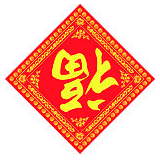If you’re living in China or near a Chinese neighborhood, or if you have a Chinese friend that does celebrate Chinese New Year, or you aren’t close to anything Chinese but are able to surf Chinese web sites (who don’t anyways ? :-) ), you might have noticed the following festival decoration that is hanging on people’s doors, cars, or walls etc.
Have you ever thought about why it’s hanging upside down? It’s definitely not a random mistake if everybody does that.
Well, before we reveal the mystery, you need to learn these three characters first. Yes, only three characters for this post, I’m easy on you guys due to my festival mood today. :-)
| fú | dào | dào |
| |
||
|
1. T2-fu
|
2. T2-dao
|
3. T2-dao
|
It’s fairly easy to translate the meaning of blessing word “
Do you see the third character that I sneaked in after the first two characters in the table – “
Since “
 |
 |
 |
You get it, my friend?
By the way, the next “Reading, Listening and Speaking practice” is coming on the Eve of Chinese New Year (Jan 22). You’ll read and listen to the first section of an article on how a Chinese family spend their Chinese New Year Eve together. The other two sections will be published one after another next week. They are more advanced practice than the first one.
 English
English Japanese
Japanese Korean
Korean French
French German
German Spanish
Spanish Italian
Italian Arab
Arab Portuguese
Portuguese Vietnamese
Vietnamese Russian
Russian Finnish
Finnish Thai
Thai dk
dk
